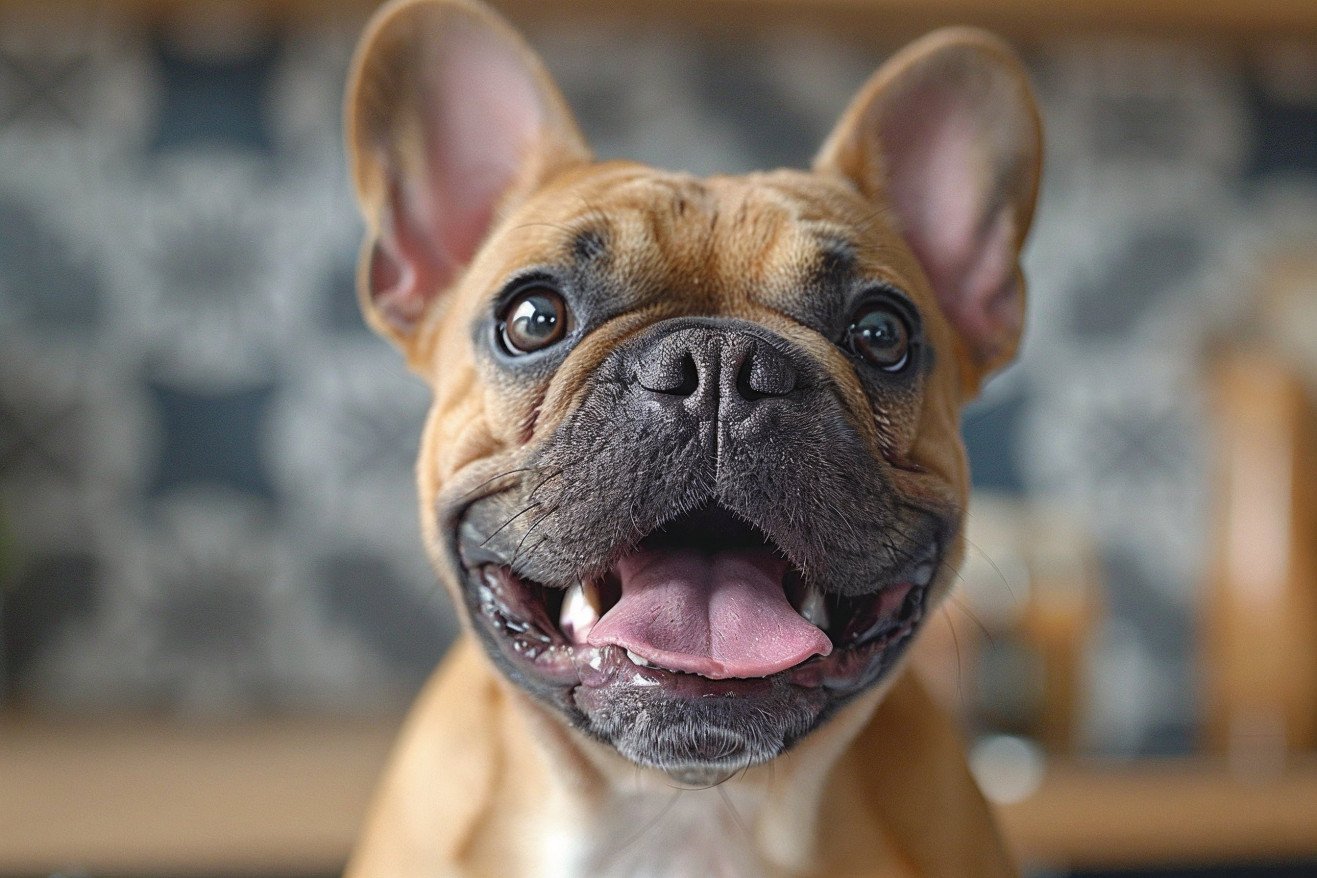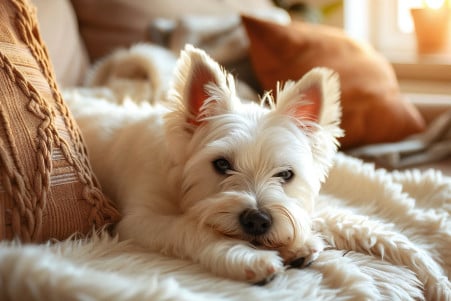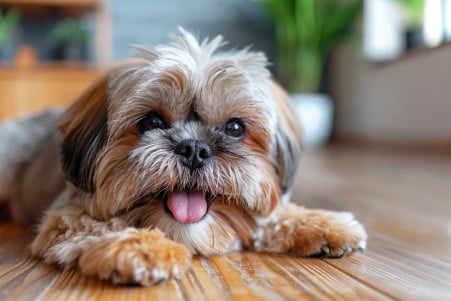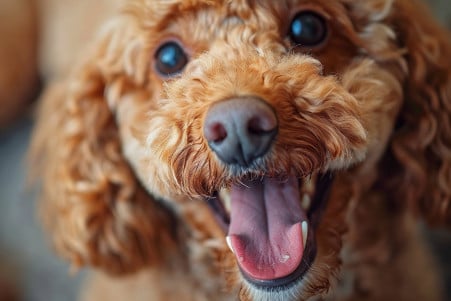Why Does My Dog Lick the Air? Exploring Canine Behavior
2 April 2024 • Updated 2 April 2024

If you’ve ever seen your dog licking the air and wondered why they do it, you’re not alone. It turns out that dogs lick the air for a variety of reasons, including a combination of scent molecules that they can detect with their powerful noses and an instinctual behavior that dates back to their ancestors, who licked the air to better understand the scents of their prey and potential mates.
In this article, we’ll explore the findings of animal behaviorists, veterinarians, and evolutionary biologists to learn more about the physiological and psychological reasons for this strange doggy behavior. From the way a dog’s vomeronasal organ works to the concepts of flehmen response and displacement behaviors, we’ll take a deep dive into the interesting reasons why so many dogs lick the air.
Why does my dog lick the air?
Behavioral Causes: When Air Licking is Normal
Air licking is a completely normal and often healthy behavior in dogs that can have a few different natural causes. One of the most important is that it helps dogs make the most of their incredible sense of smell. According to the American Kennel Club, dogs lick the air to help direct smells to the vomeronasal organ (Jacobson's organ) located in the roof of their mouth, which helps them better detect and interpret pheromones and other smells. This "flehmen response" helps dogs get more information from their world.
That said, air licking can also be a sign of excitement or anticipation, like when a dog is waiting for a treat or meal, or even a displacement behavior that dogs use to deal with stress or anxiety by expending energy elsewhere, according to a study on compulsive behaviors that Rover cites. In these instances, air licking is typically normal and nothing to worry about, and it can be seen as a normal part of dogs' behavioral and communication repertoires.
On the other hand, if air licking is excessive, persistent or compulsive, it may be a sign of an underlying problem. In fact, this normal behavior can sometimes turn into a clinical condition, which will be discussed in the next section on medical causes of excessive air licking.
Medical Causes: When Air Licking Indicates a Medical Issue
In some cases, excessive or prolonged air licking may be a sign of an underlying medical issue in dogs. For example, as PetCube points out, dental problems, including toothaches and gum disease, may lead to air licking as a way to soothe the pain. Similarly, gastrointestinal issues, such as nausea, acid reflux, or other digestive problems, can cause more frequent air licking, according to Oakbrook Animal Hospital.
In addition, neurological disorders, including seizures and cognitive dysfunction in senior dogs, can cause erratic or compulsive air licking, according to Pedigree. If air licking is happening in conjunction with other symptoms or changes in your dog's behavior, it's important to see a vet to get a proper diagnosis and treatment. This is because it's important to figure out the root cause of the air licking since some of the medical issues that may be causing it can be serious if they aren't treated.
Although air licking that happens every once in a while may not be a cause for concern, if it's happening all the time or in a way that seems excessive, it could be a sign of a medical issue that needs to be addressed by a vet. Knowing what the potential medical causes are can help you make sure that you're taking the necessary steps to ensure your dog's health and to get help if you notice any worrisome changes in their behavior.
Compulsive Air Licking: How to Recognize and Treat the Behavior
In some cases, air licking can become a compulsive behavior in dogs, and it may not have a clear cause or purpose. According to Vetstreet, compulsive disorders can be caused by stress, anxiety, or even a medical issue like allergies. As the compulsive behavior continues, it can start to happen in more and more situations and become harder to stop.
It is important to recognize the triggers and causes of compulsive air licking so that you can treat it effectively. According to WagWalking, compulsive behaviors are characterized by a high frequency of repetition over a long period of time and often do not seem to have a specific purpose. While the behavior may start out happening only in high arousal situations, it may start to happen in lower arousal situations as well.
Treatments for compulsive air licking can include positive reinforcement training, environmental enrichment, and treatment for any underlying medical or behavioral issues, according to Veterinary Partner. By recognizing and managing the triggers, rewarding alternative behaviors, and making sure the dog's needs are met, pet parents can help stop this ongoing and worrisome behavior.
Positive Reinforcement: How to Stop Your Dog From Licking the Air
One way to stop your dog from licking the air is through positive reinforcement training. According to PetsBest.com, this method involves rewarding and reinforcing other behaviors that you want to see while ignoring or redirecting the licking. It’s important to be consistent because you can accidentally reinforce the behavior you’re trying to stop.
You can also use high-value treats, praise, and toys as rewards, and make sure you’re rewarding the behavior you want as soon as it happens to help stop the licking. FOTP also recommends using interactive toys, stimulating activities, and regular exercise to help dogs expend their energy and reduce the likelihood of licking.
If you’re not sure how to do this on your own, you can also work with a professional dog trainer or behaviorist to make sure you’re using the right methods and to help you identify and address any underlying causes of the behavior. According to the Humane Society, timing and consistency are important when using positive reinforcement to teach new behaviors.
By using positive reinforcement and making sure your dog gets enough exercise and mental stimulation, you can help reduce your dog’s air licking and help them live a more balanced and healthy life.
Environmental Enrichment: Preventing and Managing Air Licking
Environmental enrichment can be used to help prevent and manage excessive air licking in dogs. According to Hanging with Hounds, dogs are known to self-soothe through licking, chewing, sniffing, and shredding. Therefore, interactive toys, puzzle feeders, and scent-based activities can help to engage a dog's natural instincts and reduce compulsive air licking.
Meanwhile, Bindy's Bucket List notes that increased physical exercise and mental stimulation can help to reduce boredom and excess energy, which can lead to problematic behaviors. In addition, YEGVet explains that potential stressors in a dog's environment can be managed by ensuring that the dog's routine is predictable and that their basic needs are met.
In this way, environmental enrichment and the management of potential stressors can help to prevent and manage air licking in dogs. This comprehensive approach will be important to keep in mind as we move on to the final section, which will focus on how to deal with air licking in dogs with patience and understanding.
Conclusion: How to Deal With Air Licking
Air licking can also be a sign of gastrointestinal issues in dogs. According to 1800PetMeds, air licking after meals could be a response to acid reflux or other digestive problems, like chronic pancreatitis, giardia infection, or irritable bowel syndrome. The excessive licking and swallowing may be the dog's way of trying to alleviate the discomfort.
Air licking can also become a compulsive behavior that has nothing to do with physical issues. PetCareRx notes that dogs may lick the air in response to stress and anxiety, and if the behavior becomes repetitive, it can lead to a compulsive disorder.
Whether it's a medical or behavioral issue, it's important to address the root cause of air licking to stop the behavior. According to the Bluffton Sun, redirecting the dog's licking behavior to something more appropriate, such as a Kong toy, can be helpful, as can using deterrents and training to stop the compulsive behavior.
With the right approach, patience, and understanding, air licking can be managed or addressed to help dogs and their owners live happier, healthier lives.


